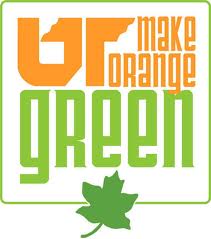 There is nothing like the experience of spending a Saturday in Knoxville, TN, with 102,000 of your closest friends, most of them dressed in Tennessee orange, making their way to Neyland Stadium for football in the southland. It’s a sea of orange, and at the University of Tennessee, they are endeavoring to turn that orange into green.
“Make Orange Green” is a program started in the fall of 2006 that promotes and coordinates environmental stewardship activities at the University of Tennessee. The initiative is a joint effort between the Committee on the Campus Environment, the Facilities Services Department, the Office of Communications and Marketing and the Student Environmental Initiatives Committee.
Some ways UT – Knoxville makes orange green:
There is nothing like the experience of spending a Saturday in Knoxville, TN, with 102,000 of your closest friends, most of them dressed in Tennessee orange, making their way to Neyland Stadium for football in the southland. It’s a sea of orange, and at the University of Tennessee, they are endeavoring to turn that orange into green.
“Make Orange Green” is a program started in the fall of 2006 that promotes and coordinates environmental stewardship activities at the University of Tennessee. The initiative is a joint effort between the Committee on the Campus Environment, the Facilities Services Department, the Office of Communications and Marketing and the Student Environmental Initiatives Committee.
Some ways UT – Knoxville makes orange green:
- To reduce waste during residence hall move-out days, UT collaborates with Goodwill Industries to collect useable clothing, household items etc. from students as they move out. The university also collects nonperishable food items and donate them to the 2nd Harvest Food Bank and the Love Kitchen. UT donated about 6,000 pounds of clothing, furniture and so on last year, and more than 11,000 pounds the two previous years. It also recycles any electronics or other such recyclables collected during move-out.
- The UT recycling program partnered with Starbucks to collect coffee grounds in Hodges Library and the Starbucks in the University Center. The grounds are mixed with the leaf compost. When school is in session, approximately 80 pounds of coffee grounds are collected per day for composting.
- UT’s Department of Facilities Services, with support from the Institute of Agriculture, is currently composting all of the campus’ fall leaf waste — more than 65 tons of material a year. Each month the compost pile is turned and watered. The leaves “cook” at a temperature of around 140º. Compost created in the pile has been used in the plantings around the Plant Biotech Building on campus and in various seasonal flowerbeds. Using the compost “closes the loop” and completes the recycling process.
- In 2009, the Knoxville campus received the Energy Efficiency Leadership Award at the first annual Summit for Campus Sustainability, a conference organized by the Southern Alliance for Clean Energy.
- The Princeton Review gave UT Knoxville a “green rating” of 85 out of 99 in its “Guide to 286 Green Colleges” (2010). Among other efforts, the publication cites the campus sustainable building policy that makes the LEED rating system the standard for all new construction and renovation projects exceeding $5 million.
- The Sustainable Endowments Institute gave UT Knoxville an ‘A’ grade in the Climate Change & Energy category of its 2010 report card. The institute noted that carbon emissions from campus operations have decreased by 2% from 2005 to 2008.
- In 2007, UT – Knoxville became the nation’s first university certified for its green cleaning practices. The certification praised UT’s efforts to make the work of campus cleaning an environmentally friendly process.
If you’re looking for a lovely campus, an excellent academic tradition, a winning athletic department and a university that cares about sustainability, check out the University of Tennessee in Knoxville.